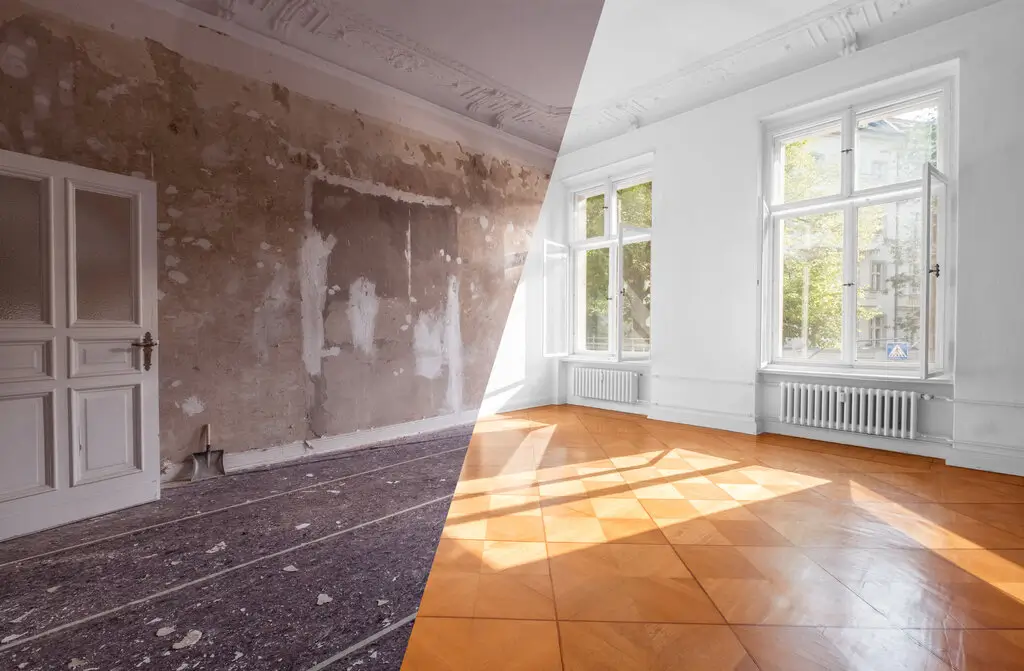Table des matières
Dernière mise à jour : décembre 2025 | Publié initialement en juin 2025. Principaux changements : Les frais d'enregistrement sont revenus au taux standard 7% le 1er juillet 2025 ; Bëllegen Akt est désormais permanent à 40 000 €/personne ; le crédit d'impôt spécifique à l'investisseur et l'amortissement accéléré 6% ont pris fin en 2024-2025.
L'achat d'un bien ancien à rénover ou l'investissement dans un logement neuf demeure l'une des décisions les plus importantes pour les acquéreurs immobiliers au Luxembourg. Alors que le marché immobilier luxembourgeois montre des signes de stabilisation jusqu'en 2025 et qu'un dispositif d'aide permanente à l'accession à la propriété est désormais en place, chaque option présente des avantages et des inconvénients spécifiques. Cet article examine ces deux possibilités, en s'intéressant particulièrement aux incitations financières et à la réglementation en vigueur.
Perspectives financières : différences de coûts
La différence la plus flagrante entre les biens immobiliers anciens et neufs réside dans leur prix d'achat. Au Luxembourg, les biens anciens sont historiquement moins chers de 15 à 201 TP3T que les biens neufs équivalents. Cet écart de prix peut être considérable, notamment sur un marché réputé pour ses prix immobiliers élevés.
Selon une étude publiée par STATEC, les appartements en construction coûtent en moyenne entre 251 et 301 TP3T de plus que les appartements existants de taille comparable. Cette économie initiale est souvent un facteur déterminant pour de nombreux acheteurs, notamment les primo-accédants disposant d'un budget limité. Au moment d'examiner vos options, il est important de bien comprendre comment procéder. évaluer la propriété Les valeurs deviennent cruciales pour prendre des décisions éclairées concernant les propriétés nouvelles et existantes.
Considérations relatives au calendrier d’achat :
Propriétés anciennes : L'acquisition peut être rapide, les ventes étant généralement conclues dans un délai de 1 à 3 mois après la signature de l'accord.
Nouvelles propriétés : Il s'agit souvent d'achats « sur plan » (VEFA) avec des délais d'attente importants jusqu'à l'achèvement
Emplacement et charme : l'avantage de la propriété ancienne
L'un des principaux arguments en faveur des biens anciens réside dans leur emplacement. Les quartiers établis en centre-ville ou à proximité des commodités sont souvent composés en majorité de bâtiments anciens. Ce constat est particulièrement pertinent dans des quartiers comme Hesperange, où il est important de comprendre coûts de location à Hesperange peut aider les investisseurs à évaluer les rendements potentiels des propriétés plus anciennes situées dans des emplacements privilégiés.
Avantages de l'emplacement des propriétés anciennes :
- Une plus grande disponibilité dans les emplacements urbains de premier choix
- Meilleure proximité des infrastructures (écoles, commerces, transports en commun)
- Quartiers établis avec des équipements matures
Au-delà des considérations pratiques, les propriétés anciennes présentent souvent des caractéristiques architecturales rarement présentes dans les constructions neuves : hauts plafonds ornés de moulures décoratives, parquets, cheminées et autres détails d'époque qui ajoutent caractère et charme. Pour les acheteurs qui apprécient ces éléments esthétiques, la rénovation d'une propriété ancienne permet de préserver ces caractéristiques tout en modernisant la maison. Lors de la préparation de ces propriétés pour la vente, secrets de présentation du home staging peut aider à mettre en valeur ces caractéristiques uniques.
La sécurité du neuf : garanties et normes
Les propriétés neuves au Luxembourg offrent d'importantes protections aux acheteurs, notamment la garantie décennale. Cette garantie couvre le bien pendant dix ans à compter de la fin des travaux, le protégeant contre les vices de construction et les problèmes majeurs.
Depuis le 1er janvier 2017, tous les nouveaux bâtiments au Luxembourg doivent répondre aux normes de construction passive et obtenir la classe d'efficacité énergétique AAA. Cette note AAA correspond à une efficacité énergétique, une isolation thermique et un impact environnemental optimaux, avec une consommation énergétique quasi nulle (NZEB = Nearly Zero Energy Building).
Les nouvelles constructions intègrent également les dernières normes d’efficacité énergétique, des systèmes de câblage, de plomberie et de chauffage modernes, ce qui peut entraîner une réduction des coûts des services publics et des dépenses d’entretien au cours des premières années de propriété.
Subventions à la rénovation : faire du neuf avec du vieux
Le Luxembourg propose un soutien financier important pour la rénovation des logements anciens, ce qui rend cette option de plus en plus attractive. Ces subventions visent à améliorer à la fois l'habitabilité et l'efficacité énergétique, et il est important de comprendre ces aspects. subventions financières au logement peut avoir un impact significatif sur votre budget de rénovation.
Le programme Klimabonus
Pour les bâtiments de plus de 10 ans, le programme Klimabonus offre une aide financière substantielle pour les rénovations visant à améliorer l'efficacité énergétique. Le programme peut couvrir jusqu'à 62,51 TP3T d'un projet de rénovation énergétique. Cette subvention s'applique à divers projets de rénovation :
- Isolation de la toiture, des murs extérieurs et des dalles de plancher
- Remplacement de fenêtres
- Installation de systèmes de ventilation contrôlée
- Installation de systèmes techniques utilisant des sources d'énergie renouvelables
L’augmentation 25% Klimabonus pour les mesures de rénovation (y compris la ventilation mécanique contrôlée) s’applique aux demandes d“” accord de principe » soumises avant le 31 décembre 2025, les dates de l’accord de principe et de la facture déterminant l’éligibilité.
Subvention pour l'amélioration du logement
La subvention pour l'amélioration des logements anciens peut couvrir jusqu'à 401 000 000 $ de frais de rénovation pour les propriétés de plus de 10 ans. Cette aide est soumise à conditions de ressources, son montant variant selon les revenus et la situation familiale.
Les travaux admissibles comprennent :
- Réparation ou remplacement de toiture
- Assèchement des murs humides
- Installations de salles de bains et de toilettes
- Installations ou rénovations de systèmes de chauffage
- Remplacement de fenêtres et rénovation de façades
Réduction de la TVA pour les rénovations
Le Luxembourg applique un taux de TVA super-réduit de 3% (au lieu du taux standard de 17%) pour les travaux de rénovation des résidences principales. Cette mesure de logement en vigueur est limitée à 50 000 € par logement et s’applique à la plupart des travaux de rénovation, bien que certaines exclusions existent (comme les cuisines aménagées et l’aménagement paysager). Le taux 3% est soumis à des conditions d'admissibilité et à une récupération potentielle si l'utilisation de la propriété change dans les 10 ans.
Situation financière actuelle (décembre 2025)
Frais d'inscription
À compter du 1er juillet 2025, les frais d'enregistrement standard du code 7% s'appliquent à tous les achats de propriété. La réduction temporaire des frais 50% (à 3,5%), en vigueur du 1er octobre 2024 au 30 juin 2025, n'est plus applicable. Pour les biens immobiliers neufs comme anciens, les acquéreurs doivent prévoir dans leur budget l'intégralité des frais d'enregistrement 7% et des frais de transcription 1%.
Crédit d'impôt permanent “ Bëllegen Akt ”
Excellente nouvelle pour les acheteurs de résidences principales : le crédit d’impôt “ Bëllegen Akt ” a été pérennisé à 40 000 € par personne (80 000 € pour les couples) à compter du 1er juillet 2025. Cette amélioration permanente s'applique aux propriétés neuves et anciennes destinées à servir de résidences principales, offrant un soutien substantiel et continu à l'accession à la propriété sans la pression du temps liée à l'expiration des délais.
Avantages des propriétés écoénergétiques
Les propriétés affichant une haute performance énergétique (notamment de classe A+) continuent de bénéficier d'un traitement préférentiel, incluant des taux d'intérêt hypothécaires plus avantageux (jusqu'à une réduction de 0,4 point). Ces avantages s'appliquent aussi bien aux logements neufs (qui doivent légalement répondre aux normes AAA) qu'aux logements anciens rénovés ayant obtenu une excellente performance énergétique.
Incitations pour les investisseurs (mise à jour décembre 2025)
Le crédit d'impôt spécialisé pour investisseurs (Bëllegen Akt Investisseurs) de 20 000 € par personne pour les acquisitions VEFA a pris fin le 31 décembre 2024 et n'est plus applicable. De même, la mesure d'amortissement accéléré 6% pour les investissements dans la construction neuve a pris fin le 30 septembre 2025.
Toutefois, les avantages d’amortissement standard restent disponibles : 2% annuellement pour les propriétés locatives, avec des taux accélérés 4% pour les propriétés achevées il y a moins de cinq ans (limité à deux propriétés par contribuable ou quatre pour les couples).
Comprendre le contexte plus large de contrats de location et droits des locataires devient important pour les investisseurs qui envisagent des propriétés locatives, qu'elles soient neuves ou rénovées.
Bilan des coûts en décembre 2025
Pour illustrer les différences de coûts réelles en décembre 2025, voici une comparaison réaliste :
Scénario : Appartements comparables de 120 m² à Hesperange
Voie de rénovation des propriétés anciennes :
- Prix d'achat : 500 000 €
- Inscription + transcription (8%) : 40 000 €
- Coût des rénovations : 100 000 €
- Sous-total : 640 000 €
- Moins : Crédit Bëllegen Akt (couple) : -80 000 €
- Investissement net : 560 000 €
- De plus : Potentiel de subvention Klimabonus : jusqu'à 62 500 € (62,51 TP3T pour une rénovation de 100 000 €)
- Coût effectif après subventions : environ 497 500 €
Nouvelle voie d'achat immobilier :
- Prix d'achat : 625 000 € (prime typique pour un modèle 25%)
- Inscription + transcription (8%) : 50 000 €
- Rénovation : 0 €
- Sous-total : 675 000 €
- Moins : Crédit Bëllegen Akt (couple) : -80 000 €
- Investissement net : 595 000 €
Différence de coût : environ 97 500 € en faveur de la rénovation d'un bien plus ancien. (avec les subventions maximales appliquées)
Cet exemple démontre que même avec les frais d'enregistrement standard 7% (et non la réduction temporaire 3.5% expirée), la rénovation d'une propriété plus ancienne peut offrir des économies importantes, en particulier lorsque les subventions à la rénovation sont maximisées.
Prendre votre décision : considérations clés
Lorsque vous décidez entre une nouvelle propriété et la rénovation d'une ancienne, demandez-vous si vous devez vendre en privé ou avec un agent immobilier si vous vendez également un bien existant pour financer votre achat.
Pour la rénovation de biens anciens :
- Le coût d'achat initial est inférieur, mais les frais de rénovation doivent être pris en compte
- De nombreuses options de subventions sont disponibles spécifiquement pour la rénovation (Klimabonus, subvention à l'amélioration, TVA 3%).
- Un meilleur contrôle sur la conception finale et les spécifications
- Préservation du caractère et des caractéristiques architecturales
- Généralement, de meilleurs emplacements dans les quartiers établis.
- Des économies importantes sont possibles grâce à une planification adéquate et à l'optimisation des subventions.
Pour l'achat d'un bien immobilier neuf :
- Coût initial plus élevé mais pas de dépenses de rénovation immédiates
- Des normes d'efficacité énergétique plus élevées dès le départ (AAA obligatoire)
- Garanties légales contre les défauts pendant 10 ans
- Aménagements et équipements modernes
- Moins d'entretien dans les premières années
- Capacité d'emménagement immédiate
- Aucune gestion de projet de rénovation requise
Considérations relatives à la documentation et aux processus
Quelle que soit l'option choisie, une documentation adéquate est essentielle. Avoir tous vos documents nécessaires à une vente Une organisation dès le départ peut simplifier le processus. Pour ceux qui vendent un bien existant afin de financer leur nouvel achat, une étude approfondie liste de contrôle pour la vente d'une propriété garantit que rien n'est négligé.
Compréhension quand vendre votre propriété peut vous aider à optimiser le calendrier de votre vente et de votre nouvel achat, en particulier lors de la coordination des délais de rénovation ou des dates d'achèvement de la nouvelle construction.
Conclusion : quelle option offre le meilleur rapport qualité-prix ?
La réponse dépend en grande partie de vos priorités et de votre situation. La rénovation d'un bien immobilier ancien offre généralement un meilleur rapport qualité-prix en termes d'emplacement, de cachet et de potentiel de rendement à long terme, notamment grâce aux généreuses subventions à la rénovation offertes par le Luxembourg. Avec le crédit permanent Bëllegen Akt de 40 000 €/personne et les subventions Klimabonus couvrant jusqu’à 62,51 TP3T de rénovations énergétiques, l’argument financier en faveur de la rénovation reste convaincant en décembre 2025.
Les propriétés neuves offrent commodité, normes modernes et garanties légales, mais à un prix élevé. Elles peuvent être préférables pour ceux qui privilégient une installation immédiate et ne souhaitent pas l'incertitude des projets de rénovation.
Grâce au crédit immobilier permanent Bëllegen Akt désormais en vigueur et aux généreuses subventions à la rénovation toujours offertes par le programme Klimabonus, les deux options restent financièrement viables pour les acheteurs de décembre 2025. Votre décision devrait reposer sur vos priorités personnelles – emplacement et cachet d'un côté, confort moderne de l'autre – plutôt que sur la pression artificielle d'une échéance.
Pour obtenir des conseils complets sur la manière de choisir l'une ou l'autre voie, consultez notre guide de vente de biens immobiliers au Luxembourg fournit des informations précieuses sur l'ensemble du processus de transaction immobilière.
En définitive, la décision repose sur vos préférences personnelles, vos contraintes budgétaires et vos objectifs de logement à long terme. Le contexte financier actuel, avec ses mécanismes de soutien permanents, vous permet de faire ce choix en fonction de ce qui compte vraiment pour vous, plutôt que de vous précipiter pour profiter d'incitations qui expirent.
Pour un accompagnement personnalisé dans votre projet d'achat ou de rénovation immobilière, incluant une analyse de marché détaillée, des estimations de coûts et un soutien professionnel tout au long du processus, contactez zeas.immo. Notre expertise du marché immobilier luxembourgeois et de la région d'Hesperange vous garantit les informations nécessaires pour faire le meilleur choix selon votre situation.





Rejoignez la discussion